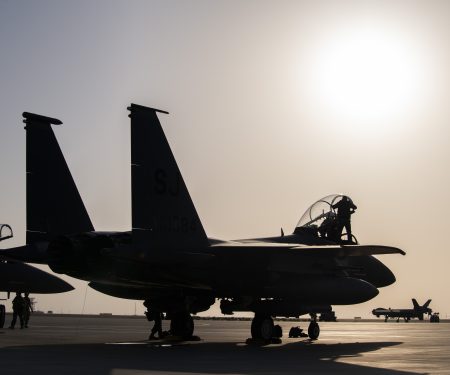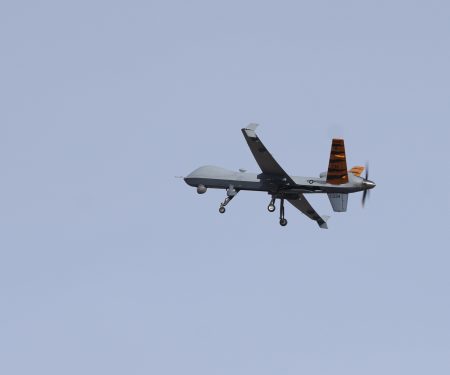F-15Es and A-10s Join Red Flag-Like Exercise on Arabian Peninsula
RTX Exits the Space Prime Business, Won’t Make SDA Satellites
New Report: Engine Problems Led to MQ-9 Crash in Africa Last Year
Radar Sweep
Pentagon Announces New $6 Billion Military Aid Package for Ukraine
Defense Secretary Lloyd Austin announced a new $6 billion weapons purchases for Ukraine on April 26 that he said is the biggest so far and will purchase new weapons systems for Ukraine, including additional Patriot missiles it needs to counter Russian missile barrages on its cities.
Northrop’s Rocket Fuel Factory Is Slow to Take Off
The Pentagon long relied on one U.S. company to make the main ingredient that fuels its most powerful missiles. Northrop Grumman’s effort to build a second source has been slow to take off. Years after building a factory to make more of the key chemical, Northrop’s output is still missing from the fuel powering many U.S. weapon systems—when global conflicts have spurred demand for a range of tactical missiles. A new $95 billion spending package to support Ukraine, Israel, and Taiwan will further bolster weapons demand abroad and pay to replenish U.S. arsenals.
With US Aid Resumed, Ukraine Will Try to Dig Itself Out of Trouble
A long-awaited influx of U.S. weapons will help Ukraine to blunt Russia’s advance in the coming months, Biden administration officials said after Congress passed a major aid package, but an acute troop shortage and Moscow’s firepower advantage mean that Kyiv won’t likely regain major offensive momentum until 2025 at the earliest.
PODCAST: Royal Air Force Insights: Air Chief Marshal Sir Richard Knighton
In episode 180 of the Aerospace Advantage podcast, Heather “Lucky” Penney and retired Lt. Gen. David Deptula chat with the head of the Royal Air Force. The plans and priorities for Royal Air Force airpower and spacepower are incredibly impactful for the U.S. Air Force and Space Force. Topics discussed include lessons learned from Ukraine, projecting power into the Pacific, deterrence in the modern era, space as a contested domain, plus the impact of technologies like AI and CCAs. We also discuss program updates regarding types like the F-35, E-7, MQ-9B, and Tempest.
What Spending Caps? Senators Open to Boosting the Pentagon’s Budget
Capitol Hill powerbrokers came together to fund the government and pass a $95 billion foreign aid deal. Now some top lawmakers are opening the door a crack to another feat: boosting the Pentagon budget. Lead Republicans on the House and Senate Armed Services committees have already said they’re open to busting spending caps for the Pentagon as part of annual defense policy legislation.
B-1 Bomber Rises from the ‘Boneyard’ to Rejoin the Air Force’s Fleet
After a yearslong sabbatical in the desert, a retired B-1B Lancer will soon rejoin the Air Force’s bomber fleet. The aircraft, nicknamed “Lancelot,” is slated to replace another B-1 bomber whose engine exploded during routine maintenance at Dyess Air Force Base, Texas, in April 2022. The accident caused more than $15 million in damages and sent an Airman to a hospital with minor injuries, according to an Air Force investigation.
Boeing Buys GKN Factory, Ending Dispute over F-15, F/A-18 Parts
Boeing has agreed to buy a St. Louis-area facility from GKN Aerospace that supplies critical parts for the Boeing F-15 and F/A-18 fighter jets, a lifeline for the aerospace giant’s fighter production that also ends contentious litigation between the two parties. The transaction would see GKN’s F-15 and F/A-18 operations immediately transition to Boeing, according to a Boeing press release. Additionally, Boeing has agreed to hire 550 GKN employees, the bulk of GKN’s workforce at the site located in the St. Louis suburb of Hazelwood, Mo.
Another US Precision-Guided Weapon Falls Prey to Russian Electronic Warfare, US Says
U.S.-provided precision-guided munitions have failed in mission after mission in Ukraine, taken down by Russian electronic warfare. On April 24, the Pentagon revealed the latest casualty. A new ground-launched version of an air-to-ground weapon developed for Ukraine on a rapid timeline failed to hit targets in part because of Russian electro-magnetic warfare, Bill LaPlante, the Pentagon's acquisition chief, said at an event held by think tank CSIS.
Defense Innovation Unit Moves to Ease Commercial Drone Certifications
The Defense Innovation Unit wants to improve its process for vetting commercial drones, with the goal of making it easier for companies to sell their systems to the U.S. military. Director Doug Beck said April 23 the organization will host a competitive effort this fall aimed at onboarding more commercial drones through its Blue UAS certification, which validates that the systems are cybersecure and include no technology made by Chinese suppliers.
Space Force Opens Bidding for Classified Communications Satellites
The U.S. Space Force is kicking off a major procurement of next-generation communications satellites critical to the nation’s nuclear command, control ,and communications network. This estimated $8 billion procurement, known as Evolved Strategic Satcom (ESS), will supplement and eventually replace the existing Advanced Extremely High Frequency (AEHF) satellite constellation.
Air Force Plans Industry Roundtables on Effective Uses, Adoption of Generative AI
The Department of the Air Force plans to lead a series of roundtables with industry and academia to discuss how and where generative artificial intelligence can be leveraged for the department’s operations. The DAF’s Office of the Chief Information Officer and Chief Data and Artificial Intelligence Office wants to host three sessions in the coming months—one with small businesses, one with large businesses, and one with the academic community.
UK Spending Millions to Improve Road Safety around US Air Force Bases
The United Kingdom will spend at least $6.5 million to improve road safety near two bases hosting the U.S. Air Force. The work is to be carried out near RAF Barford St. John, Oxfordshire, and RAF Croughton in Northamptonshire. The bases are about 9 miles from each other. It comes after an American driver hit and killed a 19-year-old British motorcyclist outside the Croughton base in 2019, prompting the country’s transport secretary to launch a review of road safety in the area.
Ukraine Appears to Be Using Light Planes Converted into Reusable Bomber Drones
Images posted on a Russian Telegram channel of an inverted but intact crashed light airplane appear to indicate that Ukraine may have converted it into a remotely operated bomber. ... This appears to be the first time one was adapted into a reusable weapon that can have kinetic effects by dropping ordnance, not crashing into a target and detonating.
So Does the Air Force Have New Aces Now?
The U.S. Air Force defines an “ace” as any pilot that has more than five combat kills. It’s been decades since American pilots reached that status, but that might have changed this month. On April 13, Iran and its partners in Syria and Yemen fired more than 300 munitions—more than 150 drones as well as dozens of ballistic missiles and several cruise missiles—toward Israel. Elements of the British, French, Jordanian, and American militaries helped Israel intercept 99 percent of those munitions. Among that, F-15E fighter jets from the U.S. Air Force’s 494th Fighter Squadron and 335th Fighter Squadron shot down more than 80 Iranian drones before they could reach their target.




